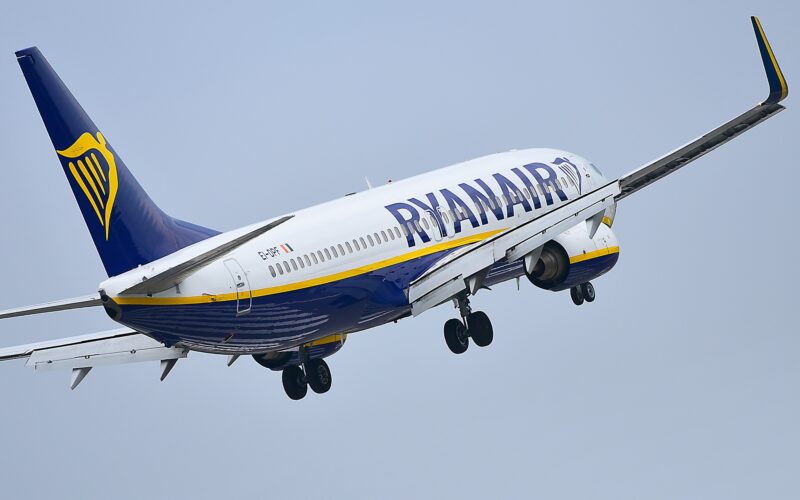Ryanair expects that airline consolidation will continue in Europe during the next two years but warns that capacity growth will be constrained by lagging aircraft deliveries.
The Irish low-cost carrier group, which includes Ryanair, Buzz, Lauda, and Malta Air, ended FY2023 with a net profit of €1.43 billion ($1.5 billion), despite ending Q4 FY2023 with a net loss of €154 million ($166.3 million).
The group carried 168.6 million passengers throughout the financial year, which is a 74% increase compared to 97.1 million the previous financial year, with an average load factor of 93% (FY2022: 82%). Revenues grew from €4.8 billion ($5.1 billion) to €10.7 billion ($11.5 billion) between FY2022 and FY2023, with operating costs rising during the same period, from €5.2 billion ($5.6 billion) to €9.2 billion ($9.9 billion).
At the end of the financial period, which finished on March 31, 2023, Ryanair operated 537 aircraft, 98 of which were Boeing 737 MAX-8200 planes nicknamed “Gamechangers” by the airline.
The airline group opened five new bases and 300 new routes in FY2023.
Ryanair’s growing market share
The airline noted that its market share has grown significantly within markets across the European Union (EU).
“Ryanair’s market share has grown significantly in most EU markets as we operated 116% of our pre-Covid capacity in FY23. Most notable gains were recorded in Italy (from 27% to 40%), Poland (26% to 36%) and Ireland (49% to 58%),” the airline commented in its financial results presentation for FY2023.
This carrier also noted that it will operate its “largest-ever schedule” this summer, offering 3,000 daily flights and a total of 2,500 routes throughout the three-month period.
Capacity in the EU is lower compared to pre-COVID-19, with numerous airlines going bust or reducing fleets during the pandemic, and issues such as high oil prices and a shortage of new and leased aircraft impacting the ability of surviving carriers to deploy capacity. However, Ryanair claimed “demand is notably robust”.
“Forward bookings and air fares currently into [Summer 2023] are strong and we continue to urge all customers to book early to avoid rising “close-in” prices,” the low-cost carrier continued.
However, the company also expects that airlines will continue to consolidate across the continent over the next two years, with competing carriers deploying capacity in a “disciplined manner”.
“The large backlog of OEM aircraft deliveries is likely to constrain capacity growth in Europe for at least 4 more years which confers a considerable growth premium on Ryanair’s remaining 110 B737 Gamechangers deliveries over the next 3 summers,” the airline added.
Aircraft deliveries impacting outlook
Going forward the carrier remains cautiously optimistic that it can achieve its target of carrying 185 million passengers by the end of FY2024.
However, the airline also noted that recent delivery delays from Boeing could push the growth of traffic into the “lower yielding H2 [FY2024] and may reduce this target [185 million passengers – ed. note] slightly”.
The airline stated that it expects to be short of up to 10 Boeing 737 MAX-8200 aircraft for the peak months of June and July 2023.
“To facilitate Boeing, and to assist their resumption of scheduled B-8200 deliveries this autumn, we will take delivery of aircraft through July (and possibly into Aug.). We hope and expect that Boeing will recover quickly from this recent delay to minimise its impact on our FY24 traffic growth and profitability,” Ryanair added.
In addition to supply chain constraints, Boeing has been forced to suspend some 737 MAX deliveries due to a production issue at Spirit AeroSystems, a Tier 1 supplier for the manufacturer. Boeing had previously issued guidance stating that while it hopes to deliver between 400 and 450 B737 MAX aircraft in 2023, the delivery delays will remove around 9,000 seats from customers’ schedules during the summer.
While Ryanair said that it has a “significant cost advantage” over its competitors, costs excluding fuel are expected to grow in H1 2023 and “will not be fully offset by B737 Gamechanger deliveries”.
Still, demand for the upcoming summer remains robust, with peak fares trending ahead of summer 2022.
The airline group noted that it remains “cautiously optimistic that FY24 revenue will grow sufficiently to cover our €1bn [$1.08 billion] higher fuel bill and still deliver a modest year-on-year profit increase”.
But the guidance is also dependent on events such as the war in Ukraine and the delivery schedule of Boeing aircraft.

